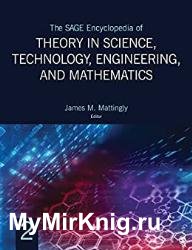 Название: The SAGE Encyclopedia of Theory in Science, Technology, Engineering, and Mathematics Название: The SAGE Encyclopedia of Theory in Science, Technology, Engineering, and Mathematics
Автор: James Mattingly
Издательство: SAGE Publications, Inc.
Год: 2023
Страниц: 1057
Язык: английский
Формат: pdf (true)
Размер: 43.4 MB
Theories are part and parcel of every human activity that involves knowing about the world and our place in it. In all areas of inquiry from the most commonplace to the most scholarly and esoteric, theorizing plays a fundamental role. The SAGE Encyclopedia of Theory in Science, Technology, Engineering, and Mathematics focuses on the ways that various STEM disciplines theorize about their subject matter. How is thinking about the subject organized? What methods are used in moving a novice in given field into the position of a competent student of that subject? Within the pages of this landmark work, readers will learn about the complex decisions that are made when framing a theory, what goes into constructing a powerful theory, why some theories change or fail, how STEM theories reflect socio-historical moments in time and how "at their best" they form the foundations for exploring and unlocking the mysteries of the world around us.
The first division in the structure of the encyclopedia is between general matters having to do with science and theory and specific matters having to do with particular disciplines within STEM.
I. General Theory of Science: Here you will find entries having to do with the nature of science, including its authoritativeness, the way its claims are tested, in short the basic conceptual features of the scientific enterprise as a whole.
II. Nature and Structure of Theories: Here the discussion remains general and at a high level of abstraction but the focus is more specifically on the nature of scientific theory. What kind of thing is a theory? How is it connected to other things we do in the sciences? What have theorists about theories learned over the last century from science and from analysis of science, and what has science itself learned from such theorizing.
III. Formal Disciplines: These disciplines are less grounded in empirical data and more focused on concepts. But that is not to say that empirical matters can be entirely neglected. Even in logic and mathematics, but especially in Computer Science (CS) questions of resources and the role of complexity make it impossible to fully detach oneself from facts about the world. Even so entries here are more focused on structural features of theories, in addition to specific disciplinary matters. This topic is further divided into:
1. Computer Science
2. Logic and Mathematics
IV. Empirical Disciplines: The empirical disciplines as well are not monolithically empirical. Constraints from the nature of mathematics and logic have an impact on the kinds of theory that are possible here. But these entries are more directed to specific developments in observationally testable domains as well as to the connection between theoretical and observational features. This topic is further divided into:
1. Biological Science
2. Chemistry
3. Cognitive Sciences
4. Earth and Space Sciences
5. Engineering
6. Physics
7. Technology
Скачать The SAGE Encyclopedia of Theory in Science, Technology, Engineering, and Mathematics
|